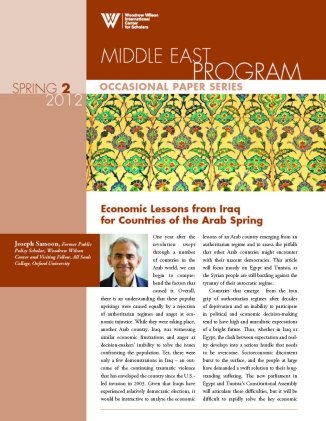Economic Lessons from Iraq for Countries of the Arab Spring (Spring 2 2012)


Overall, there is an understanding that the Arab Spring was caused equally by a rejection of authoritarian regimes and anger at economic injustice. Iraq was witnessing similar economic frustrations and anger at decision-makers’ inability to solve the issues confronting the population. Yet, there were only a few demonstrations in Iraq. Given that Iraqis have experienced relatively democratic elections, Sassoon analyzes the economic lessons of an Arab country emerging from an authoritarian regime and assesses the pitfalls that other Arab countries might encounter with their nascent democracies. This article focuses mostly on Egypt and Tunisia, as the Syrian people are still battling against the tyranny of their autocratic regime.
About the Author


Middle East Program
The Wilson Center’s Middle East Program serves as a crucial resource for the policymaking community and beyond, providing analyses and research that helps inform US foreign policymaking, stimulates public debate, and expands knowledge about issues in the wider Middle East and North Africa (MENA) region. Read more











